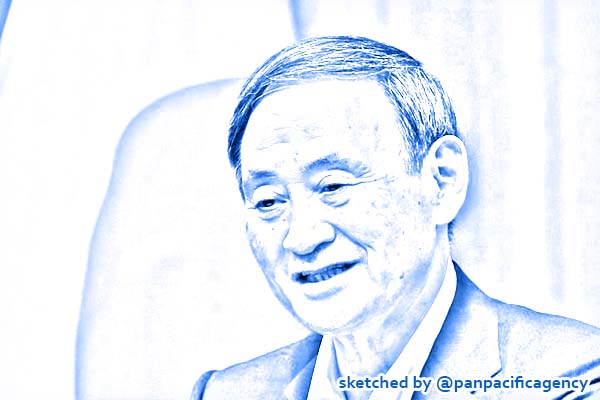Japan, US, Australia, India vow to build free, open Indo-Pacific

Yoshihide Suga. PHOTO: REUTERS. Sketched by the Pan Pacific Agency.
TOKYO, Oct 6, 2020, Kyodo. Prime Minister Yoshihide Suga and the foreign ministers of the United States, Australia and India agreed Tuesday to step up coordination in creating a free and open Indo-Pacific, in a veiled counter to China’s rising assertiveness in the region, Kyodo News reported.
Suga, U.S. Secretary of State Mike Pompeo, Australian Foreign Minister Marise Payne and Indian External Affairs Minister Subrahmanyam Jaishankar affirmed strengthening of a free, open and rules-based international order, the Japanese government said in a statement issued after a meeting in Tokyo.
The four major Indo-Pacific democracies, collectively known as the Quad, vowed to coordinate in ensuring peace and stability of the region, it said.
Speaking at the meeting, Suga said a free and open Indo-Pacific is “widely recognized by the international community as a vision of peace and prosperity of this region,” and that his government’s basic policy is to “further continue advancing our members to this end.”
Suga, who assumed the premiership on Sept. 16 in the first change of Japan’s leadership in nearly eight years, underscored the need to deepen quadrilateral ties, particularly as the novel coronavirus has spread globally.
“The international community is facing multiple and various challenges. This is exactly why right now is the time that we must further deepen our coordination with as many countries as possible that share our vision,” he said.
In separate bilateral talks, Suga and Pompeo affirmed close coordination in addressing North Korea’s abductions of Japanese nationals in the 1970s and 1980s, according to the Japanese government.
Pompeo threw the United States’ full support behind Japan’s hosting of the Olympics and Paralympics in the summer of 2021, it said.
In a meeting earlier Tuesday, Foreign Minister Toshimitsu Motegi and Pompeo reaffirmed the strength of the Japan-U.S. alliance under Suga, with Motegi saying, “I look forward to Japan and the U.S. taking the lead in enforcing and realizing a free and open Indo-Pacific.”
The top U.S. diplomat, known for his hard-line stance against China, agreed that a free and open Indo-Pacific is the foundation of regional peace and stability.
“The foundation’s cornerstone is the U.S.-Japan relationship and the security and prosperity it has provided for our peoples for decades,” he said.
Under former Prime Minister Shinzo Abe’s initiative, Japan has been promoting a vision of a free and open Indo-Pacific — including the upholding of the rule of law, freedom of navigation and overflight, and peaceful settlement of disputes — in coordination with other countries.
Motegi and Pompeo agreed to promote the development of, and fair access to, vaccines for the novel coronavirus, according to the Japanese Foreign Ministry.
They also exchanged views on China’s increased territorial claims in the East and South China seas, while Motegi said Tokyo wants to cooperate in the field of cyber security as well.
Pompeo was initially slated to travel to South Korea and Mongolia as well, but the trips to the two other countries were canceled after U.S. President Donald Trump was hospitalized due to contracting coronavirus.
Pompeo tested negative for the virus before he departed from the United States. Japan has exempted him and the other foreign ministers from its 14-day quarantine policy on the condition that they do not, among other things, leave their accommodations except for work purposes.